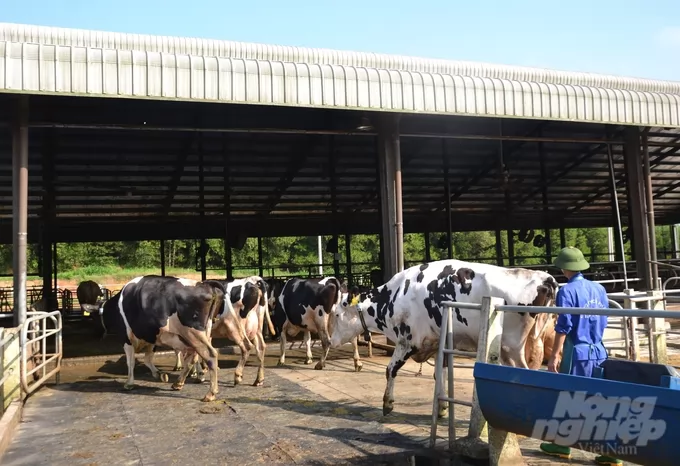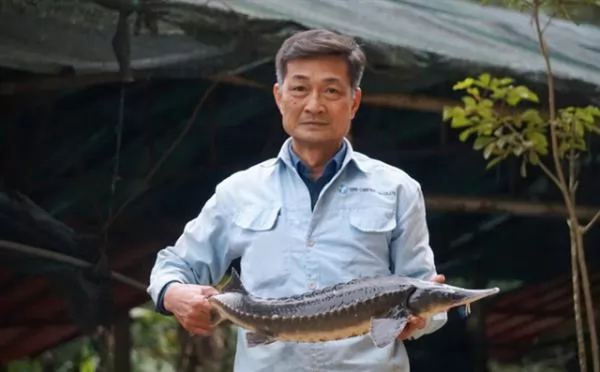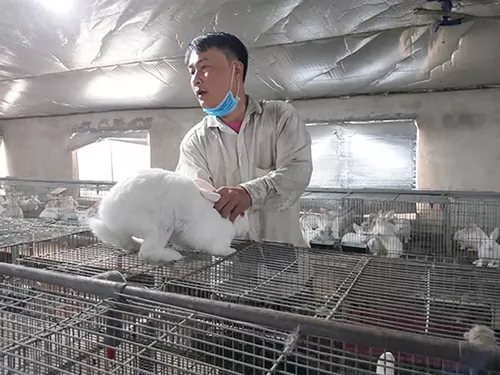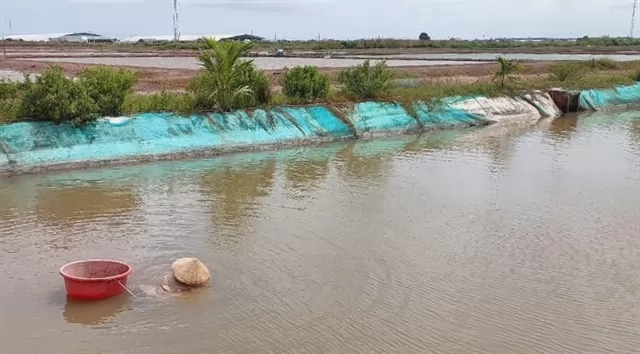Disease-free livestock farming helps farms in Tuyen Quang 'leisurely' avoid disease

Ho Toan Dairy Farm is a pioneer in disease-free livestock farming in Tuyen Quang. Photo: Dao Thanh.
(VAN) Disease-free livestock farming is the key to helping farmers in Tuyen Quang avoid the epidemic with ease.
Recent information from Tuyen Quang Sub-Department of Livestock Production, Animal Health and Fisheries shows that the province currently has 46 livestock farms certified to produce according to VietGAHP and GlobalGAP standards. The number of farms certified to be disease-free is 13/111 livestock farms. Nearly 71% of livestock farms in the area have waste treatment systems that are safe for the environment.
Although the figures are not considered big compared to the general level of the province’s livestock industry, this is already a visible improvement compared to previous years. In particular, large-scale livestock enterprises, organizations and households are strictly aware of the role of veterinary work and the importance of disease safety in livestock farming.
Ho Toan Joint Stock Company (My Bang commune, Yen Son district) raises more than 2,700 dairy cows imported from Australia, with a scale of 17 barns, 2 milking parlors, and 2 waste treatment systems. To protect the health of the cows, for many years the company has focused on disease-free farming, strictly controlling people and vehicles entering and leaving the farms, and proactively implementing disinfection and sterilization measures.
As for vaccination, the company organizes the list of cows and calves that are due for vaccination according to regulations and builds a professional vaccination team to ensure the best implementation of monthly vaccination work.
Ho Toan also strictly monitors the frequency of disinfectant spraying in barns, playgrounds, and milking parlors, spreads lime powder in key areas, and operates the disinfection staff so that the process is done with the correct technique.
“The company's herd of cows supplies the market with 45 tons of milk every day on average. Therefore, if veterinary work is not carried out well and disease safety is not guaranteed, not only will it affect the health of the animals but the quality of the milk will not be able to meet the requirements of large customers and seriously affect the production and business activities,” said Luong Duy Toan, Director of Ho Toan Joint Stock Company.

Disease-free livestock farming helps many large-scale livestock farms in Tuyen Quang avoid disease. Photo: Dao Thanh.
For many years, the livestock farm of Sang Nhung Cooperative in Dong Tho Commune, Son Duong District has always taken one step ahead in terms of disease-free livestock farming. The cooperative now has 3,500 pigs, including 500 sows and 3,000 commercial pigs.
To make sure that the pigs are not infected with disease, the farm strictly controls entry and exit to the farm. All workers at the farm have a concentrated living area. If they enter or leave the livestock area, they must be isolated and disinfected within 3 days. Periodic vaccination is also carried out meticulously. Thanks to putting extra effort into this stage, the farm has always successfully stood firm during many peak outbreaks of African swine fever.
According to Nguyen Ngoc Sang, Director of Sang Nhung Cooperative, strictly implementing disease-safe livestock farming will make farmers feel more secure when dangerous pathogens are lurking in the environment.
Suffering from zero epidemic and well-implementing livestock farming measures in line with VietGAHP standards, the cooperative now has 7 pork products that have achieved OCOP stars, including 3 products that have achieved 4 stars and 4 products that have achieved 3 stars. It is striving to have 5 more products qualifying for OCOP stars by 2025.
Aiming to promote sustainable development of the livestock industry, Tuyen Quang province has developed a Scheme for the construction and development of disease-safe livestock areas in the province for the period 2024 - 2030. Accordingly, this province will focus on building disease-safe livestock areas in Son Duong and Ham Yen districts, moving towards developing more livestock areas that can be safe against dangerous infectious diseases.
Tuyen Quang also plans to create conditions for sustainable livestock development and chain livestock farming, increase product value, provide safe products with certified product origin, and attract investment in deep processing right at the local level in service of domestic consumption and export.
Tuyen Quang province strives that by 2030, the proportion of concentrated livestock farming, livestock production value and the proportion of livestock farming in the agricultural and forestry structure of localities implementing the Scheme will increase by 3 - 5% compared to before the implementation.
Author: Dao Thanh
Translated by Samuel Pham
Maybe you are interested

Cold-water fish breeder in Thanh Hoá earns a high profit
Hà Khắc Sâm said on average each year he sells about eight or nine tonnes of fish, with a selling price of VNĐ400,000/kg for salmon and VNĐ250,000/kg for sturgeon.

Tuyên Quang rabbit farmer profits from raising New Zealand breed
TUYÊN QUANG - Raising New Zealand rabbits is providing a good income - about VNĐ200 million (US$8,600) net profit per year - to Nguyễn Công Định, living in the northern province of Tuyên Quang, as restaurants have a high demand for rabbit meat.

Bạc Liêu Province farmers increase incomes by adding blood cockles to shrimp ponds
Farmers in Bạc Liêu Province are breeding blood cockles in shrimp ponds as it offers high incomes.





